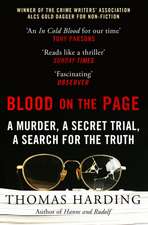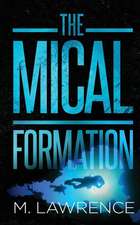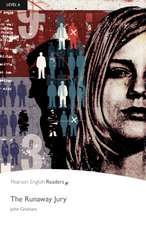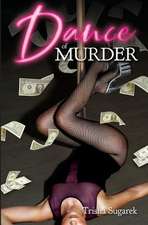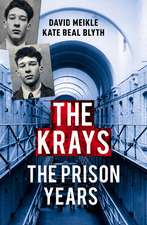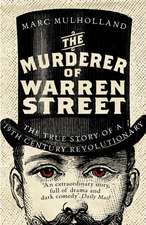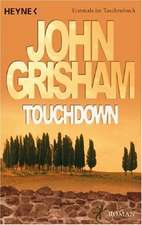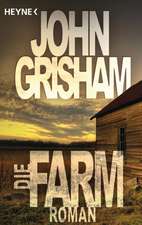The Innocent Man
Autor John Grishamen Limba Engleză Paperback – 20 dec 2018
| Toate formatele și edițiile | Preț | Express |
|---|---|---|
| Paperback (4) | 61.05 lei 23-34 zile | +25.28 lei 6-10 zile |
| CORNERSTONE – 20 dec 2018 | 61.05 lei 23-34 zile | +25.28 lei 6-10 zile |
| CORNERSTONE – 13 iul 2017 | 62.03 lei 23-34 zile | +26.98 lei 6-10 zile |
| Dell Publishing Company – 29 feb 2012 | 63.46 lei 3-5 săpt. | |
| DELTA – 31 oct 2007 | 101.47 lei 3-5 săpt. | |
| Hardback (1) | 209.63 lei 3-5 săpt. | |
| Doubleday Books – 30 sep 2006 | 209.63 lei 3-5 săpt. |
Preț: 61.05 lei
Preț vechi: 71.26 lei
-14% Nou
Puncte Express: 92
Preț estimativ în valută:
11.68€ • 12.07$ • 9.72£
11.68€ • 12.07$ • 9.72£
Carte disponibilă
Livrare economică 07-18 martie
Livrare express 18-22 februarie pentru 35.27 lei
Preluare comenzi: 021 569.72.76
Specificații
ISBN-13: 9781787463561
ISBN-10: 1787463567
Pagini: 528
Dimensiuni: 134 x 200 x 40 mm
Greutate: 0.37 kg
Editura: CORNERSTONE
ISBN-10: 1787463567
Pagini: 528
Dimensiuni: 134 x 200 x 40 mm
Greutate: 0.37 kg
Editura: CORNERSTONE
Recenzii
“Grisham has written both an American tragedy and his strongest legal thriller yet, all the more gripping because it happens to be true.”—Entertainment Weekly
“Grisham has crafted a legal thriller every bit as suspenseful and fast-paced as his bestselling fiction.”—The Boston Globe
“A gritty, harrowing true-crime story.”—Time
“A triumph.”—The Seattle Times
“Grisham has crafted a legal thriller every bit as suspenseful and fast-paced as his bestselling fiction.”—The Boston Globe
“A gritty, harrowing true-crime story.”—Time
“A triumph.”—The Seattle Times
Notă biografică
John Grisham is the author of forty-seven consecutive #1 bestsellers, which have been translated into nearly fifty languages. His recent books include The Judge's List, Sooley, and his third Jake Brigance novel, A Time for Mercy, which is being developed by HBO as a limited series.
Grisham is a two-time winner of the Harper Lee Prize for Legal Fiction and was honored with the Library of Congress Creative Achievement Award for Fiction.
When he's not writing, Grisham serves on the board of directors of the Innocence Project and of Centurion Ministries, two national organizations dedicated to exonerating those who have been wrongfully convicted. Much of his fiction explores deep-seated problems in our criminal justice system.
John lives on a farm in central Virginia.
Grisham is a two-time winner of the Harper Lee Prize for Legal Fiction and was honored with the Library of Congress Creative Achievement Award for Fiction.
When he's not writing, Grisham serves on the board of directors of the Innocence Project and of Centurion Ministries, two national organizations dedicated to exonerating those who have been wrongfully convicted. Much of his fiction explores deep-seated problems in our criminal justice system.
John lives on a farm in central Virginia.
Extras
Chapter 1
The rolling hills of southeast Oklahoma stretch from Norman across to Arkansas and show little evidence of the vast deposits of crude oil that were once beneath them. Some old rigs dot the countryside; the active ones churn on, pumping out a few gallons with each slow turn and prompting a passerby to ask if the effort is really worth it. Many have simply given up, and sit motionless amid the fields as corroding reminders of the glory days of gushers and wildcatters and instant fortunes.
There are rigs scattered through the farmland around Ada, an old oil town of sixteen thousand with a college and a county courthouse. The rigs are idle, though–the oil is gone. Money is now made in Ada by the hour in factories and feed mills and on pecan farms.
Downtown Ada is a busy place. There are no empty or boarded-up buildings on Main Street. The merchants survive, though much of their business has moved to the edge of town. The cafés are crowded at lunch.
The Pontotoc County Courthouse is old and cramped and full of lawyers and their clients. Around it is the usual hodgepodge of county buildings and law offices. The jail, a squat, windowless bomb shelter, was for some forgotten reason built on the courthouse lawn. The methamphetamine scourge keeps it full.
Main Street ends at the campus of East Central University, home to four thousand students, many of them commuters. The school pumps life into the community with a fresh supply of young people and a faculty that adds some diversity to southeastern Oklahoma.
Few things escape the attention of the Ada Evening News, a lively daily that covers the region and works hard to compete with The Oklahoman, the state’s largest paper. There’s usually world and national news on the front page, then state and regional, then the important items–high school sports, local politics, community calendars, and obituaries.
The people of Ada and Pontotoc County are a pleasant blend of small-town southerners and independent westerners. The accent could be from east Texas or Arkansas, with flat i’s and other long vowels. It’s Chickasaw country. Oklahoma has more Native Americans than any other state, and after a hundred years of mixing many of the white folks have Indian blood. The stigma is fading fast; indeed, there is now pride in the heritage.
The Bible Belt runs hard through Ada. The town has fifty churches from a dozen strains of Christianity. They are active places, and not just on Sundays. There is one Catholic church, and one for the Episcopalians, but no temple or synagogue. Most folks are Christians, or claim to be, and belonging to a church is rather expected. A person’s social status is often determined by religious affiliation.
With sixteen thousand people, Ada is considered large for rural Oklahoma, and it attracts factories and discount stores. Workers and shoppers make the drive from several counties. It is eighty miles south and east of Oklahoma City, and three hours north of Dallas. Everybody knows somebody working or living in Texas.
The biggest source of local pride is the quarter-horse “bidness.” Some of the best horses are bred by Ada ranchers. And when the Ada High Cougars win another state title in football, the town struts for years.
It’s a friendly place, filled with people who speak to strangers and always to each other and are anxious to help anyone in need. Kids play on shaded front lawns. Doors are left open during the day. Teenagers cruise through the night causing little trouble.
Had it not been for two notorious murders in the early 1980s, Ada would have gone unnoticed by the world. And that would have been just fine with the good folks of Pontotoc County.
As if by some unwritten city ordinance, most of the nightclubs and watering holes in Ada were on the periphery of the town, banished to the edges to keep the riffraff and their mischief away from the better folks. The Coachlight was one such place, a cavernous metal building with bad lighting, cheap beer, jukeboxes, a weekend band, a dance floor, and outside a sprawling gravel parking lot where dusty pickups greatly outnumbered sedans. Its regulars were what you would expect–factory workers looking for a drink before heading home, country boys looking for fun, late-night twenty-somethings, and the dance and party crowd there to listen to live music. Vince Gill and Randy Travis passed through early in their careers.
It was a popular and busy place, employing many part-time bartenders and bouncers and cocktail waitresses. One was Debbie Carter, a twenty-one-year-old local girl who’d graduated from Ada High School a few years earlier and was enjoying the single life. She held two other part-time jobs and also worked occasionally as a babysitter. Debbie had her own car and lived by herself in a three-room apartment above a garage on Eighth Street, near East Central University. She was a pretty girl, darkhaired, slender, athletic, popular with the boys, and very independent.
Her mother, Peggy Stillwell, worried that she was spending too much time at the Coachlight and other clubs. She had not raised her daughter to live such a life; in fact, Debbie had been raised in the church. After high school, though, she began partying and keeping later hours. Peggy objected and they fought occasionally over the new lifestyle. Debbie became determined to have her independence. She found an apartment, left home, but remained very close to her mother.
On the night of December 7, 1982, Debbie was working at the Coachlight, serving drinks and watching the clock. It was a slow night, and she asked her boss if she could go off-duty and hang out with some friends. He did not object, and she was soon sitting at a table having a drink with Gina Vietta, a close friend from high school, and some others. Another friend from high school, Glen Gore, stopped by and asked Debbie to dance. She did, but halfway through the song she suddenly stopped and angrily walked away from Gore. Later, in the ladies’ restroom, she said she would feel safer if one of her girlfriends would spend the night at her place, but she did not say what worried her.
The Coachlight began closing early, around 12:30 a.m., and Gina Vietta invited several of their group to have another drink at her apartment. Most said yes; Debbie, though, was tired and hungry and just wanted to go home. They drifted out of the club, in no particular hurry.
Several people saw Debbie in the parking lot chatting with Glen Gore as the Coachlight was shutting down. Tommy Glover knew Debbie well because he worked with her at a local glass company. He also knew Gore. As he was getting in his pickup truck to leave, he saw Debbie open the driver’s door of her car. Gore appeared from nowhere, they talked for a few seconds, then she pushed him away.
Mike and Terri Carpenter both worked at the Coachlight, he as a bouncer, she as a waitress. As they were walking to their car, they passed Debbie’s. She was in the driver’s seat, talking to Glen Gore, who was standing beside her door. The Carpenters waved good-bye and kept walking. A month earlier Debbie had told Mike that she was afraid of Gore because of his temper.
Toni Ramsey worked at the club as a shoe-shine girl. The oil business was still booming in Oklahoma in 1982. There were plenty of nice boots being worn around Ada. Someone had to shine them, and Toni picked up some much-needed cash. She knew Gore well. As Toni left that night, she saw Debbie sitting behind the wheel of her car. Gore was on the passenger’s side, crouching by the open door, outside the car. They were talking in what seemed to be a civilized manner. Nothing appeared to be wrong.
Gore, who didn’t own a car, had bummed a ride to the Coachlight with an acquaintance named Ron West, arriving there around 11:30. West ordered beers and settled in to relax while Gore made the rounds. He seemed to know everyone. When last call was announced, West grabbed Gore and asked him if he still needed a ride. Yes, Gore said, so West went to the parking lot and waited for him. A few minutes passed, then Gore appeared in a rush and got in.
They decided they were hungry, so West drove to a downtown café called the Waffler, where they ordered a quick breakfast. West paid for the meal, just as he’d paid for the drinks at the Coachlight. He had started the night at Harold’s, another club where he’d gone looking for some business associates. Instead, he bumped into Gore, who worked there as an occasional bartender and disc jockey. The two hardly knew each oher, but when Gore asked for a ride to the Coachlight, West couldn’t say no.
West was a happily married father with two young daughters and didn’t routinely keep late hours in bars. He wanted to go home but was stuck with Gore, who was becoming more expensive by the hour. When they left the café, West asked his passenger where he wanted to go. To his mother’s house, Gore said, on Oak Street, just a few blocks to the north. West knew the town well and headed that way, but before they made it to Oak Street, Gore suddenly changed his mind. After riding around with West for several hours, Gore wanted to walk. The temperature was frigid and falling, with a raw wind. A cold front was moving in.
They stopped near the Oak Avenue Baptist Church, not far from where Gore said his mother lived. He jumped out, said thanks for everything, and began walking west.
The Oak Avenue Baptist Church was about a mile from Debbie Carter’s apartment.
Gore’s mother actually lived on the other side of town, nowhere near the church.
Around 2:30 a.m., Gina Vietta was in her apartment with some friends when she received two unusual phone calls, both from Debbie Carter. In the first call, Debbie asked Gina to drive over and pick her up because someone, a visitor, was in her apartment and he was making her feel uncomfortable. Gina asked who it was, who was there? The conversation was cut short by muffled voices and the sounds of a struggle over the use of the phone. Gina was rightfully worried and thought the request strange. Debbie had her own car, a 1975 Oldsmobile, and could certainly drive herself anywhere. As Gina was hurriedly leaving her apartment, the phone rang again. It was Debbie, saying that she had changed her mind, things were fine on her end, don’t bother. Gina again asked who the visitor was, but Debbie changed the subject and would not give his name. She asked Gina to call her in the morning, to wake her so she wouldn’t be late for work. It was an odd request, one Debbie had never made before.
Gina started to drive over anyway, but had second thoughts. She had guests in her apartment. It was very late. Debbie Carter could take care of herself, and besides, if she had a guy in her room, Gina didn’t want to intrude. Gina went to bed and forgot to call Debbie a few hours later.
Around 11:00 a.m. on December 8, Donna Johnson stopped by to say hello to Debbie. The two had been close in high school before Donna moved to Shawnee, an hour away. She was in town for the day to see her parents and catch up with some friends. As she bounced up the narrow outdoor staircase to Debbie’s garage apartment, she slowed when she realized she was stepping on broken glass. The small window in the door was broken. For some reason, her first thought was that Debbie had locked her keys inside and been forced to break a window to get in.
Donna knocked on the door. There was no answer. Then she heard music from a radio inside. When she turned the knob, she realized the door was not locked. One step inside, and she knew something was wrong.
The small den was a wreck–sofa cushions thrown on the floor, clothing scattered about. Across the wall to the right someone had scrawled, with some type of reddish liquid, the words “Jim Smith next will die.”
Donna yelled Debbie’s name; no response. She had been in the apartment once before, so she moved quickly to the bedroom, still calling for her friend. The bed had been moved, yanked out of place, all the covers pulled off. She saw a foot, then on the floor on the other side of the bed she saw Debbie–facedown, nude, bloody, with something written on her back.
Donna froze in horror, unable to step forward, instead staring at her friend and waiting for her to breathe. Maybe it was just a dream, she thought.
She backed away and stepped into the kitchen, where, on a small white table, she saw more words scribbled and left behind by the killer. He could still be there, she suddenly thought, then ran from the apartment to her car. She sped down the street to a convenience store where she found a phone and called Debbie’s mother.
Peggy Stillwell heard the words, but could not believe them. Her daughter was lying on the floor nude, bloodied, not moving. She made Donna repeat what she had said, then ran to her car. The battery was dead. Numb with fear, she ran back inside and called Charlie Carter, Debbie’s father and her ex-husband. The divorce a few years earlier had not been amicable, and the two rarely spoke.
No one answered at Charlie Carter’s. A friend named Carol Edwards lived across the street from Debbie. Peggy called her, told her something was terribly wrong, and asked her to run and check on her daughter. Then Peggy waited and waited. Finally she called Charlie again, and he answered the phone.
Carol Edwards ran down the street to the apartment, noticed the same broken glass and the open front door. She stepped inside and saw the body.
Charlie Carter was a thick-chested brick mason who occasionally worked as a bouncer at the Coachlight. He jumped in his pickup and raced toward his daughter’s apartment, along the way thinking every horrible thought a father could have. The scene was worse than anything he could have imagined.
When he saw her body, he called her name twice. He knelt beside her, gently lifted her shoulder so he could see her face. A bloody washcloth was stuck in her mouth. He was certain his daughter was dead, but he waited anyway, hoping for some sign of life. When there was none, he stood slowly and looked around. The bed had been moved, shoved away from the wall, the covers were missing, the room was in disarray. Obviously, there had been a struggle. He walked to the den and saw the words on the wall, then he went to the kitchen and looked around. It was a crime scene now. Charlie stuffed his hands in his pockets and left.
Donna Johnson and Carol Edwards were on the landing outside the front door, crying and waiting. They heard Charlie say good-bye to his daughter and tell her how sorry he was for what had happened to her. When he stumbled outside, he was crying, too.
“Should I call an ambulance?” Donna asked.
“No,” he said. “Ambulance won’t do no good. Call the police.”
From the Hardcover edition.
The rolling hills of southeast Oklahoma stretch from Norman across to Arkansas and show little evidence of the vast deposits of crude oil that were once beneath them. Some old rigs dot the countryside; the active ones churn on, pumping out a few gallons with each slow turn and prompting a passerby to ask if the effort is really worth it. Many have simply given up, and sit motionless amid the fields as corroding reminders of the glory days of gushers and wildcatters and instant fortunes.
There are rigs scattered through the farmland around Ada, an old oil town of sixteen thousand with a college and a county courthouse. The rigs are idle, though–the oil is gone. Money is now made in Ada by the hour in factories and feed mills and on pecan farms.
Downtown Ada is a busy place. There are no empty or boarded-up buildings on Main Street. The merchants survive, though much of their business has moved to the edge of town. The cafés are crowded at lunch.
The Pontotoc County Courthouse is old and cramped and full of lawyers and their clients. Around it is the usual hodgepodge of county buildings and law offices. The jail, a squat, windowless bomb shelter, was for some forgotten reason built on the courthouse lawn. The methamphetamine scourge keeps it full.
Main Street ends at the campus of East Central University, home to four thousand students, many of them commuters. The school pumps life into the community with a fresh supply of young people and a faculty that adds some diversity to southeastern Oklahoma.
Few things escape the attention of the Ada Evening News, a lively daily that covers the region and works hard to compete with The Oklahoman, the state’s largest paper. There’s usually world and national news on the front page, then state and regional, then the important items–high school sports, local politics, community calendars, and obituaries.
The people of Ada and Pontotoc County are a pleasant blend of small-town southerners and independent westerners. The accent could be from east Texas or Arkansas, with flat i’s and other long vowels. It’s Chickasaw country. Oklahoma has more Native Americans than any other state, and after a hundred years of mixing many of the white folks have Indian blood. The stigma is fading fast; indeed, there is now pride in the heritage.
The Bible Belt runs hard through Ada. The town has fifty churches from a dozen strains of Christianity. They are active places, and not just on Sundays. There is one Catholic church, and one for the Episcopalians, but no temple or synagogue. Most folks are Christians, or claim to be, and belonging to a church is rather expected. A person’s social status is often determined by religious affiliation.
With sixteen thousand people, Ada is considered large for rural Oklahoma, and it attracts factories and discount stores. Workers and shoppers make the drive from several counties. It is eighty miles south and east of Oklahoma City, and three hours north of Dallas. Everybody knows somebody working or living in Texas.
The biggest source of local pride is the quarter-horse “bidness.” Some of the best horses are bred by Ada ranchers. And when the Ada High Cougars win another state title in football, the town struts for years.
It’s a friendly place, filled with people who speak to strangers and always to each other and are anxious to help anyone in need. Kids play on shaded front lawns. Doors are left open during the day. Teenagers cruise through the night causing little trouble.
Had it not been for two notorious murders in the early 1980s, Ada would have gone unnoticed by the world. And that would have been just fine with the good folks of Pontotoc County.
As if by some unwritten city ordinance, most of the nightclubs and watering holes in Ada were on the periphery of the town, banished to the edges to keep the riffraff and their mischief away from the better folks. The Coachlight was one such place, a cavernous metal building with bad lighting, cheap beer, jukeboxes, a weekend band, a dance floor, and outside a sprawling gravel parking lot where dusty pickups greatly outnumbered sedans. Its regulars were what you would expect–factory workers looking for a drink before heading home, country boys looking for fun, late-night twenty-somethings, and the dance and party crowd there to listen to live music. Vince Gill and Randy Travis passed through early in their careers.
It was a popular and busy place, employing many part-time bartenders and bouncers and cocktail waitresses. One was Debbie Carter, a twenty-one-year-old local girl who’d graduated from Ada High School a few years earlier and was enjoying the single life. She held two other part-time jobs and also worked occasionally as a babysitter. Debbie had her own car and lived by herself in a three-room apartment above a garage on Eighth Street, near East Central University. She was a pretty girl, darkhaired, slender, athletic, popular with the boys, and very independent.
Her mother, Peggy Stillwell, worried that she was spending too much time at the Coachlight and other clubs. She had not raised her daughter to live such a life; in fact, Debbie had been raised in the church. After high school, though, she began partying and keeping later hours. Peggy objected and they fought occasionally over the new lifestyle. Debbie became determined to have her independence. She found an apartment, left home, but remained very close to her mother.
On the night of December 7, 1982, Debbie was working at the Coachlight, serving drinks and watching the clock. It was a slow night, and she asked her boss if she could go off-duty and hang out with some friends. He did not object, and she was soon sitting at a table having a drink with Gina Vietta, a close friend from high school, and some others. Another friend from high school, Glen Gore, stopped by and asked Debbie to dance. She did, but halfway through the song she suddenly stopped and angrily walked away from Gore. Later, in the ladies’ restroom, she said she would feel safer if one of her girlfriends would spend the night at her place, but she did not say what worried her.
The Coachlight began closing early, around 12:30 a.m., and Gina Vietta invited several of their group to have another drink at her apartment. Most said yes; Debbie, though, was tired and hungry and just wanted to go home. They drifted out of the club, in no particular hurry.
Several people saw Debbie in the parking lot chatting with Glen Gore as the Coachlight was shutting down. Tommy Glover knew Debbie well because he worked with her at a local glass company. He also knew Gore. As he was getting in his pickup truck to leave, he saw Debbie open the driver’s door of her car. Gore appeared from nowhere, they talked for a few seconds, then she pushed him away.
Mike and Terri Carpenter both worked at the Coachlight, he as a bouncer, she as a waitress. As they were walking to their car, they passed Debbie’s. She was in the driver’s seat, talking to Glen Gore, who was standing beside her door. The Carpenters waved good-bye and kept walking. A month earlier Debbie had told Mike that she was afraid of Gore because of his temper.
Toni Ramsey worked at the club as a shoe-shine girl. The oil business was still booming in Oklahoma in 1982. There were plenty of nice boots being worn around Ada. Someone had to shine them, and Toni picked up some much-needed cash. She knew Gore well. As Toni left that night, she saw Debbie sitting behind the wheel of her car. Gore was on the passenger’s side, crouching by the open door, outside the car. They were talking in what seemed to be a civilized manner. Nothing appeared to be wrong.
Gore, who didn’t own a car, had bummed a ride to the Coachlight with an acquaintance named Ron West, arriving there around 11:30. West ordered beers and settled in to relax while Gore made the rounds. He seemed to know everyone. When last call was announced, West grabbed Gore and asked him if he still needed a ride. Yes, Gore said, so West went to the parking lot and waited for him. A few minutes passed, then Gore appeared in a rush and got in.
They decided they were hungry, so West drove to a downtown café called the Waffler, where they ordered a quick breakfast. West paid for the meal, just as he’d paid for the drinks at the Coachlight. He had started the night at Harold’s, another club where he’d gone looking for some business associates. Instead, he bumped into Gore, who worked there as an occasional bartender and disc jockey. The two hardly knew each oher, but when Gore asked for a ride to the Coachlight, West couldn’t say no.
West was a happily married father with two young daughters and didn’t routinely keep late hours in bars. He wanted to go home but was stuck with Gore, who was becoming more expensive by the hour. When they left the café, West asked his passenger where he wanted to go. To his mother’s house, Gore said, on Oak Street, just a few blocks to the north. West knew the town well and headed that way, but before they made it to Oak Street, Gore suddenly changed his mind. After riding around with West for several hours, Gore wanted to walk. The temperature was frigid and falling, with a raw wind. A cold front was moving in.
They stopped near the Oak Avenue Baptist Church, not far from where Gore said his mother lived. He jumped out, said thanks for everything, and began walking west.
The Oak Avenue Baptist Church was about a mile from Debbie Carter’s apartment.
Gore’s mother actually lived on the other side of town, nowhere near the church.
Around 2:30 a.m., Gina Vietta was in her apartment with some friends when she received two unusual phone calls, both from Debbie Carter. In the first call, Debbie asked Gina to drive over and pick her up because someone, a visitor, was in her apartment and he was making her feel uncomfortable. Gina asked who it was, who was there? The conversation was cut short by muffled voices and the sounds of a struggle over the use of the phone. Gina was rightfully worried and thought the request strange. Debbie had her own car, a 1975 Oldsmobile, and could certainly drive herself anywhere. As Gina was hurriedly leaving her apartment, the phone rang again. It was Debbie, saying that she had changed her mind, things were fine on her end, don’t bother. Gina again asked who the visitor was, but Debbie changed the subject and would not give his name. She asked Gina to call her in the morning, to wake her so she wouldn’t be late for work. It was an odd request, one Debbie had never made before.
Gina started to drive over anyway, but had second thoughts. She had guests in her apartment. It was very late. Debbie Carter could take care of herself, and besides, if she had a guy in her room, Gina didn’t want to intrude. Gina went to bed and forgot to call Debbie a few hours later.
Around 11:00 a.m. on December 8, Donna Johnson stopped by to say hello to Debbie. The two had been close in high school before Donna moved to Shawnee, an hour away. She was in town for the day to see her parents and catch up with some friends. As she bounced up the narrow outdoor staircase to Debbie’s garage apartment, she slowed when she realized she was stepping on broken glass. The small window in the door was broken. For some reason, her first thought was that Debbie had locked her keys inside and been forced to break a window to get in.
Donna knocked on the door. There was no answer. Then she heard music from a radio inside. When she turned the knob, she realized the door was not locked. One step inside, and she knew something was wrong.
The small den was a wreck–sofa cushions thrown on the floor, clothing scattered about. Across the wall to the right someone had scrawled, with some type of reddish liquid, the words “Jim Smith next will die.”
Donna yelled Debbie’s name; no response. She had been in the apartment once before, so she moved quickly to the bedroom, still calling for her friend. The bed had been moved, yanked out of place, all the covers pulled off. She saw a foot, then on the floor on the other side of the bed she saw Debbie–facedown, nude, bloody, with something written on her back.
Donna froze in horror, unable to step forward, instead staring at her friend and waiting for her to breathe. Maybe it was just a dream, she thought.
She backed away and stepped into the kitchen, where, on a small white table, she saw more words scribbled and left behind by the killer. He could still be there, she suddenly thought, then ran from the apartment to her car. She sped down the street to a convenience store where she found a phone and called Debbie’s mother.
Peggy Stillwell heard the words, but could not believe them. Her daughter was lying on the floor nude, bloodied, not moving. She made Donna repeat what she had said, then ran to her car. The battery was dead. Numb with fear, she ran back inside and called Charlie Carter, Debbie’s father and her ex-husband. The divorce a few years earlier had not been amicable, and the two rarely spoke.
No one answered at Charlie Carter’s. A friend named Carol Edwards lived across the street from Debbie. Peggy called her, told her something was terribly wrong, and asked her to run and check on her daughter. Then Peggy waited and waited. Finally she called Charlie again, and he answered the phone.
Carol Edwards ran down the street to the apartment, noticed the same broken glass and the open front door. She stepped inside and saw the body.
Charlie Carter was a thick-chested brick mason who occasionally worked as a bouncer at the Coachlight. He jumped in his pickup and raced toward his daughter’s apartment, along the way thinking every horrible thought a father could have. The scene was worse than anything he could have imagined.
When he saw her body, he called her name twice. He knelt beside her, gently lifted her shoulder so he could see her face. A bloody washcloth was stuck in her mouth. He was certain his daughter was dead, but he waited anyway, hoping for some sign of life. When there was none, he stood slowly and looked around. The bed had been moved, shoved away from the wall, the covers were missing, the room was in disarray. Obviously, there had been a struggle. He walked to the den and saw the words on the wall, then he went to the kitchen and looked around. It was a crime scene now. Charlie stuffed his hands in his pockets and left.
Donna Johnson and Carol Edwards were on the landing outside the front door, crying and waiting. They heard Charlie say good-bye to his daughter and tell her how sorry he was for what had happened to her. When he stumbled outside, he was crying, too.
“Should I call an ambulance?” Donna asked.
“No,” he said. “Ambulance won’t do no good. Call the police.”
From the Hardcover edition.



